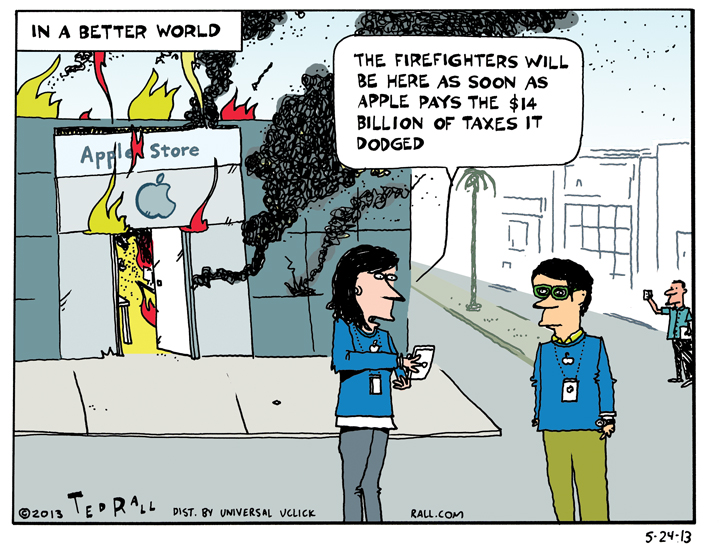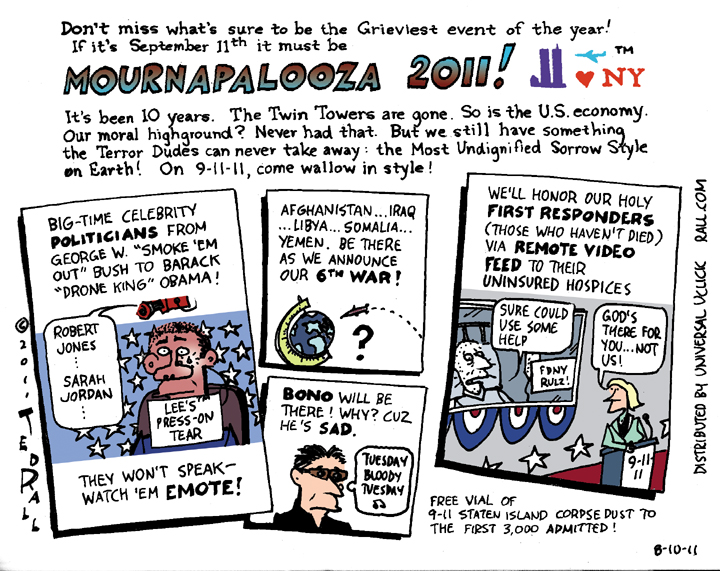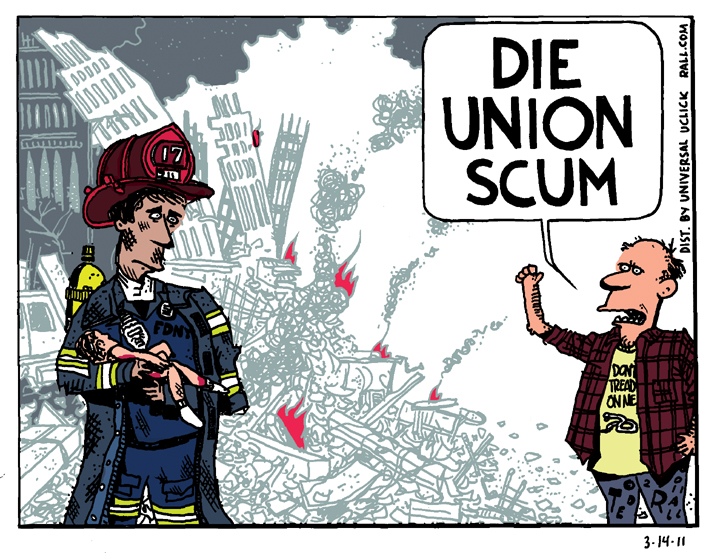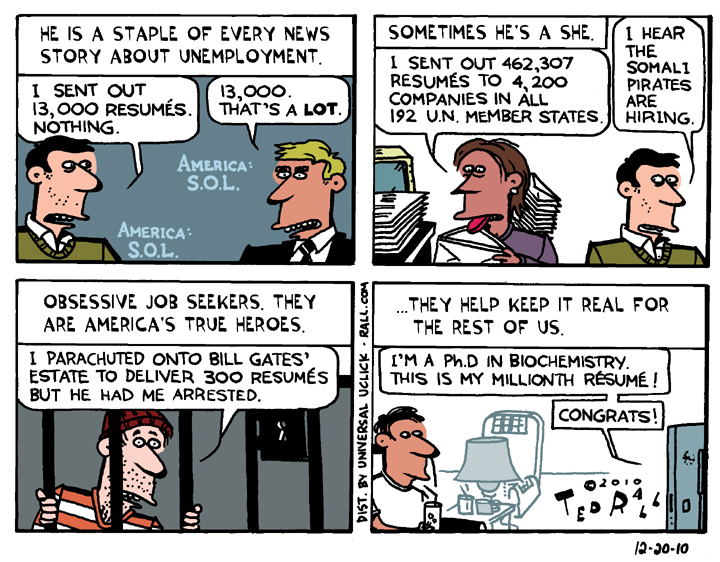According to an analysis by Congress, Apple evaded $13.8 billion in US federal taxes using complicated foreign shelters and loopholes.
SYNDICATED COLUMN: Our Politicians Need an Education
Why Both Democrats and Republicans Miss the Big Picture
Public education is mirroring American society overall: a tiny island of haves surrounded by a vast ocean of have-nots.
For worried parents and students, the good news is that spending on public education has become a campaign issue. Mitt Romney is pushing a warmed-over version of the old GOP school voucher scheme, “school choice.” The trouble with vouchers, experts say (and common sense supports), is that allowing parents to vote with their feet by withdrawing their kids from “failing schools” deprives cash-starved schools of more funds, leading to a death cycle—a “winner takes all” sweepstakes that widens the gap between the best and worst schools. Critics—liberals and libertarians—also dislike vouchers because they allow the transfer of public tax dollars into the coffers of private schools, many of which have religious, non-secular curricula unaccountable to regulators.
Romney recently attacked President Obama: “He says we need more firemen, more policemen, more teachers. Did he not get the message of [the failed recall of the union-busting governor of] Wisconsin?”
“I would suggest [Romney is] living on a different planet if he thinks that’s a prescription for a better planet,” shot back Obama strategist David Axelrod.
Both parties are missing the mark, the Republicans more than the Democrats. Republicans want to gut public schools by slashing budgets that will lead to bigger class sizes, which will reduce the individual attention dedicated to teaching each student. Democrats rightly oppose educational austerity, but are running a lame defense rather than aggressively promoting positive ideas to improve the system. Both parties are too interested in weakening unions and grading teacher performance with endless tests, and not enough in raising salaries so teaching attracts the brightest college graduates. Not even the Democrats are calling for big spending increases on education.
Is the system really in crisis? Yes, said respondents to a 2011 Gallup-Phi Delta Kappa poll, which found that only 22 percent approved of the state of public education in the U.S. The number one problem? Not enough funding, say voters.
Millions of parents whose opinion of their local public system is so dim that they spend tens of thousands of dollars a year on private school tuition and—in competitive cities like New York City, force their kids to endure a grueling application process.
According to one of the world’s leading experts on comparing public school systems, Andreas Schleicher of the Organization for Economic Cooperation and Development, the U.S. is falling rapidly behind other countries. In Canada, he told a 2010 Congressional inquiry, an average 15-year-old ahead is a full year ahead his or her American counterpart. The U.S. high-school completion rate is ranked 25th out of the 30 OECD countries.
The elephant in the room, the idea neither party is willing to consider, is to replace localized control of education—funding, administration and curricula—with centralized federal control, as is common in Europe and around the world.
“America’s system of standards, curriculums and testing controlled by states and local districts with a heavy overlay of federal rules is a ‘quite unique’ mix of decentralization and central control,” The New York Times paraphrased Schleicher’s testimony. “More successful nations, he said, maintain central control over standards and curriculum, but give local schools more freedom from regulation, he said.”
Why run public schools out of Washington? The advantages are obvious. When schools in rich districts get the same resource allocation per student as those in poor ones, influential voters among the upper and middle classes tend to push for increased spending of education. Centralized control also eliminates embarrassing situations like when the Kansas School Board eliminated teaching evolution in its schools, effectively reducing standards.
A streamlined curriculum creates smarter students. It’s easier for Americans, who live in a highly mobile society, to transfer their children midyear from school to school, when a school in Peoria teaches the same math lesson the same week as one in Honolulu. Many students, especially among the working poor, suffer lower grades due to transiency.
Of course, true education reform would need to abolish the ability of wealthier parents to opt out of the public school system. That means banning private education and the “separate but equal” class segregation we see today, particularly in big cities, and integrating the 5.3 million kids (just under 10 percent of the total) in private primary and secondary schools into their local public systems. Decades after forced bussing, many students attend schools as racially separated as those of the Jim Crow era. The New York Times found that 650 out of New York’s 1700 public schools have student bodies composed at least 70 percent of one race—this in a city with extremely diverse demographics.
If we’re to live in a true democracy, all of our kids have to attend the same schools.
(Ted Rall’s new book is “The Book of Obama: How We Went From Hope and Change to the Age of Revolt.” His website is tedrall.com. This column originally appeared at MSNBC.com)
(C) 2012 TED RALL, ALL RIGHTS RESERVED.
SYNDICATED COLUMN: Libya: Another War We Shouldn’t Believe In
Why Won’t Obama Explain His Third War?
U.S. forces fired 110 cruise missiles at Libya on the first day of the war. Each one cost $755,000 to build; $2.8 million to transport, maintain and shoot. Austerity and budget cuts abound; there’s no money for NPR or teachers or firefighters. Note to union negotiators: the government has lots of money. They’re spending it on war.
For people too young to remember Bosnia, this is what a violent, aggressive, militarist empire looks like under a Democratic president. Where Bush rushed, Obama moseys. No one believed ex-oil man Bush when he said he was out to get rid of the evil dictator of an oil-producing state; Obama, the former community organizer, gets a pass under identical circumstances. Over the weekend, also the eighth anniversary of the start of the Iraq quagmire, there were few protests against Obama’s Libya War, all poorly attended.
I spent the weekend in New York at Leftforum, an annual gathering of anti-capitalist intellectuals. “What do you think about Libya?” people kept asking. What passes for the Left is ambivalent.
In part this waffling on Libya is due to Obama’s deadpan (read: uncowboy-like) tone. Mostly, however, the tacit consent stems from televised images of ragtag anti-Qadafi opposition forces getting strafed by Libyan air force jets. We Americans like underdogs, especially when they say they want democracy.
Still, the President is not a dictator. He can’t declare war. And while he might be able to lie his way into one, he and his party will pay at the polls if he fails to explain why we’re attacking a nation that poses no threat to the United States.
There are a lot of questions we—and journalists—should be asking Obama. Obviously, we’re broke. Our military is overextended, losing two wars against the people of Afghanistan and Iraq. How can we afford this?
Also:
1. Whom are we helping?
The U.S. and its allies are destroying Libya’s air force in order to tip the balance in the civil war in favor of anti-Qadafi forces. A similar approach, aerial bombardment of Afghan government defenses, allowed Northern Alliance rebels to break through Taliban lines and enter Kabul in 2001. It could work again in Libya.
But who are these anti-Qadafi forces? Rival tribes? Radical Islamists? Royalists? What kind of government will they establish if they win? What are their ideological and religious affiliations? If anyone in the media or the White House knows, they’re not telling.
Or perhaps, as in Iraq, the White House doesn’t have a governance plan for post-Qadafi Libya. Which, as in Iraq, could lead to chaos. No nation should go to war without considering the long-term consequences.
Before we pick sides in a conflict, shouldn’t we know for whom we are going billions of dollars further into debt?
2. Does Qadafi have the right to defend himself?
From Shea’s Whiskey Rebellion to Confederacy to the Red Scares to the Black Panthers and the Weathermen, the U.S. government has violently suppressed armed rebellions. How then can the U.S. claim moral authority to prevent other governments from doing the same thing? (“The U.S. is more moral than Libya” is not an acceptable response. Obama murders and tortures more people than Qadafi.)
3. What about self-determination?
If the Libyan people rise up and overthrow Qadafi, an authoritarian despot well past his expiration date, that’s great. Shouldn’t that struggle be a Libyan matter, to be settled between Libyans? Isn’t a government that emerges from indigenous internal struggle more likely to enjoy widespread support than one that results from outside intervention?
“Free men set themselves free,” said James Oppenheim. Can a people truly feel emancipated when they owe their freedom—and later, inexorably, their oil and gas—to a foreign superpower?
4. Why are we OK with some dictators, but not others?
Since the Middle East began blowing up we’ve heard a lot of talk about Obama’s dilemma: How do we reconcile American values with American strategic interests? In a good country—at least a non-hypocritical one—they are the same.
Obama is employing circular logic. “Why strike only Libya, when other regimes murder their citizens too?” asks Chris Good in The Atlantic Monthly. “Obama’s answer seems to be: because the UN Security Council turned its attention toward Libya, and not other places.” But the UN reacted in response to the U.S.
In other words: We’re agreeing to a request that we made ourselves.
Ideology and policy must be consistent to be credible. If we have a policy to depose dictators, then all dictators must be targeted. We can’t just take out those in countries with lots of oil. We ought to start with tyrants for which we bear responsibility: our allies and puppets. At this writing the U.S. supports or props up unpopular authoritarian regimes in Saudi Arabia, Turkmenistan, Uzbekistan, Jordan, Yemen, and elsewhere.
5. Is Libya our geostrategic business?
The United States has no substantial historical ties with, innate cultural understanding of, or geographic proximity to, Libya. Even under the imperialist doctrine of “spheres of influence” that governed international relations during the Cold War, Libya falls under the purview of other would-be interventionists. Italy, and to a lesser extent Britain and France, are former colonial masters. The Arab League and African Union have interests there. Even if you buy the sentimental argument—”Are we going to stand by and watch Qadafi slaughter his own people?”—why us? Why not the Africans or Europeans?
(Ted Rall is the author of “The Anti-American Manifesto.” His website is tedrall.com.)
COPYRIGHT 2011 TED RALL
SYNDICATED COLUMN: It’s Mourning in America: Tacky and Weird
Somber is Out. Kitsch Reigns.
Americans don’t mourn right.
We are tacky.
We are gauche.
We turn tragedy into kitsch.
Last week’s news was dominated by the aftermath of the Tucson massacre: the memorial service, the funerals, even the reopening of the Safeway supermarket.
A memorial service at a sports arena. What is wrong with us?
I say “us” because this is not a Tucson thing or an Arizona thing. It’s all too American.
Thousands of cheering fans—er, mourners—donned “Together We Thrive: Tucson & America” T-shirts, handed out by the University of Arizona. They greeted the arrival of President Bar-Rock Star Obama with applause and wolf whistles. They interrupted with raucous hoots every couple of minutes—and he did nothing to tamp down the unruly crowd. Emergency responders got a standing ovation. Attendees clapped at the mention of the nine-year-old girl who was shot to death. Arizona governor Jan Brewer was booed.
Some called it unsettling, others unseemly. I thought it was weird and tacky. A memorial service should not feel like a WWE event.
On the lawn in front of the hospital where Congresswoman Gabrielle Giffords was being treated, USA Today reported, people placed “hundreds upon hundreds of hand-scrawled notes, stuffed animals and signs condemning the violence.”
Outside the Catholic church where the funeral for Christina Green, age 9, was being held, firefighters hung a patchwork quilt “National 9/11 Flag,” oddly blending politics, religion, and George W. Bush.
Creeeep-y.
Each mass tragedy amps up the volume and surreal inappropriateness of Americans’ public expressions of grief. After 9/11 New Yorkers posted “missing” posters for people they knew were dead. Stuffed animals and grammatically challenged notes, soggy and runny, hung from the fence at St. Paul’s Chapel near Ground Zero while vendors hawked cheap framed photos of the Twin Towers a few feet away.
Obama politicized Tucson. John McCain did the same at the televised memorial service for Pat Tillman. A group of pro-Bush 9/11 widows preened for the GOP at the 2004 Republican National Convention.
From memorial pages on Facebook to memorial decals on SUVs, Americans think anything goes when you’re mourning the death of a loved one—or someone whose death made national news, which somehow makes you want to feel involved even though, of course, you are not.
Everyone has to deal with death. No one can or should tell you how to feel. Yet you do have an obligation to comport yourself with dignity, to “stay calm and carry on,” as the British poster from World War II urged. Death is inevitable, horrible, often tragic and, as Sartre said, absurd. But please don’t drag the rest of the world into your psychological abyss. Spare society the tawdry and ostentatious displays of over-the-top yowling.
Just be sad. It’s OK.
My best friend died when I was 16. I never got over it. His death still makes me sad. I’m OK with that.
I wore a suit to his funeral. There wasn’t any cheering. I don’t think an appearance by the president or the attorney general would have reduced anyone’s grief. It was a sad thing, so sad that no one could make it better, and nobody tried.
As the cultural critic Marita Sturken wrote in her 2007 book “Tourists of History: Memory, Kitsch, and Consumerism from Oklahoma City to Ground Zero,” all this tacky phony sentimentality serves a sinister purpose. Mainstream American culture is being manipulated by government and big business to separate us from what is real—death and horror—and to obscure who is behind it—our government and big business.
“This comfort culture,” says Sturken,” can be found in everything from the small souvenirs that promise reassurance at sites like Ground Zero and the Oklahoma City memorial…Much of the culture of comfort functions as a form of depoliticization and as a means to confront loss, grief, and fear through processes that disavow politics…an American public can acquiesce to its government’s aggressive political and military policies, such as the war in Iraq, when that public is constantly reassured by the comfort offered by the consumption of patriotic objects, comfort commodities, and security consumerism.”
As the economy and political system continue to collapse, we will likely see more mass shootings and terrorist attacks. Thus we should be prepared. And we should give ourselves permission to get real about mourning.
So, as a public service to the grievers of the future, I hereby offer my
Basic Etiquette Following a Massacre:
(1) When interviewed on television never say that your “heart goes out to the victims and their families.” We have heard that hoary chestnut a million too many times. Keep your heart where it belongs, inside your ribcage.
(2) If you are a public official holding a press conference about a school shooting/workplace shooting/terrorist attack, refrain from thanking a long list of local and state officials for their help. This isn’t the Oscars. You haven’t won anything. You are not going to meet Joan Rivers.
(3) Whether attending a memorial service or actual funeral, leave your hoodies, baggy pants and tanktops at home. No baseball caps. No T-shirts. Don’t wear anything with a team logo. Appropriate clothing is formal, black or very dark blue. Men wear suits with ties. Women wear long dresses. Don’t got ’em? Stay home. You don’t get to be on CNN.
(4) If you know one or more of the victims, ask their surviving relatives whether they would prefer flowers or a donation to a preferred charity. Otherwise simply choose an appropriate charity and make a donation in their name. Do not waste money on flowers and stupid stuffed animals.
(5) Unless the victims include at least one politician, no politician should speak at the service. If there is at least one dead or wounded politician, politicians who do speak should refrain from political rhetoric.
(6) No. Applause. Ever.
NEXT WEEK: Toilet etiquette. How to wipe. How to flush.
(Ted Rall is the author of “The Anti-American Manifesto.” His website is tedrall.com.)
COPYRIGHT 2011 TED RALL
Open Letter to Pro-Obama Liberals
At this time of the year I offer the Ted Rall Subscription
Service. For $30/year, you receive my cartoons and columns in your
in box before anyone else–sometimes days in advance of official
release. You also receive extras…for example, subscribers
received blog notices from Afghanistan and Iran last August.
Subscribers may purchase original art at heavily discounted rates,
and receive signed copies of my newest books at discounted rates as
well. To sign up, simply click
here.
SYNDICATED COLUMN: The Death of the Moderates
Extreme Problems Require Extreme Solutions
Given his druthers, Obama will pursue the most left-leaning course that he can get away with.” So says Jennifer Rubin, a right-wing pundit at the neoconservative-leaning Washington Post. “Obama,” Rubin claims, “would have marched through his entire liberal agenda—if he had the votes.”
This, of course, assumes that Obama ever had a liberal agenda. There’s not much evidence of that. Moreover, Obama did have the votes in Congress to get almost everything that he wanted. But he chose not to even try.
It is also not true. He did have the votes. In recent years, for example, minority Republicans in the Senate have threatened filibusters on most major Democratic initiatives. When they have 60 or more votes, Democrats file a cloture motion to stop filibusters before they start. In practice, Democrats say—and the media has been repeating their meme—that it now takes 60 votes to pass a bill in the Senate.
It isn’t true. Not now. Not ever.
What Dems fail to understand is that they are depriving themselves of a big political opportunity by embracing automated parliamentary procedure. If Republicans want to filibuster, let them drag out their District of Columbia white pages and start reading on C-Span. Footage of GOP senators stonewalling popular legislation—extensions of unemployment benefits, eliminating tax breaks for individuals who earn more than $1 million a year, or healthcare benefits for 9/11 first responders—would make for awesome attack ads in 2012.
When the Bush Administration enjoyed a razor-thin 50-vote majority in the Senate, it only needed a simple majority in order to pass major bills. Even though they should have, Democrats didn’t filibuster. Democrats lack nerve. And voters hate them for it.
There’s another factor at work: self-delusion. Much liberal disappointment with Obama stems from the fact that, on several issues, he is doing exactly what he said he was going to do during the campaign. He told us that we were going to go deeper in Afghanistan. Liberals simply chose to pretend that he was lying. It’s not Obama’s fault if people are in denial. At the same time, Obama failed to realize that the world had changed dramatically between September and November of 2008.
During the summer of the 2008 campaign, there was a plausible argument to be made that the American people were fundamentally moderate. But after the economic meltdown of September 2008, a crisis of capitalism and consumer confidence that continues today with no end in sight, the electorate moved decidedly to the left. Six months into Obama’s term, most Americans told pollsters they preferred socialism to capitalism. In early 2010 one in five Republicans said they have a positive view of socialism.
Meanwhile, the right became more radical too. This is what happens during a crisis when the “mainstream” system is unresponsive. Moderation? There are no more moderates.
As we have seen time and time again in American history, compromises usually mean no solution at all. From the status of Missouri as a slave state to last week’s tax deal between Democrats and Republicans, compromise usually means kicking the can down the road for another generation of people and politicians to contend with.
Yet the myth persists: moderation equals common sense. I don’t know about my fellow lefties, but I find more common ground with Tea Party types who are angry as hell and don’t want to take it anymore than I do with squishy soft liberals who think everything is fine as long as Barack Obama gets reelected in 2012.
Nothing is fine. The unemployment rate is over 9.8 percent officially and about 20 percent unofficially. Yet neither party has lifted a finger to even talk about proposing a jobs program. Tax cuts? Unemployed people don’t pay taxes. Depression-level joblessness is fiscal poison. If we don’t create tens of millions of new jobs soon, social and political unrest will increase dramatically.
Chris Hedges recently put out a book titled “The Death of the Liberal Class.” A better title might have been “The Death of Moderation.” No one better embodied the American brand of political moderation than traditional liberals. They supported income redistribution, but only through a slightly progressive income tax: not enough to make a difference, but plenty to make right-wingers spitting mad. They consistently voted for huge defense budgets and war after war, yet were successfully framed as wimps by Republicans whose rhetoric matched their similar bellicosity.
The smug and the complacent love moderation precisely because it can’t change the status quo.
Look at ObamaCare: that’s what happens when you compromise. The insurance companies get to soak even more Americans than usual—and charge those of us who are already in the system more. Like many other issues, the “extremes” work better than the centrist, “common sense” solution. If I can’t have full-fledged socialized medicine, give me free markets.
Moderates know their time has past. New York Mayor Michael Bloomberg recently brought 1,000 people together to create a militant moderate organization called No Labels. Like Jon Stewart’s Million Moderate March, No Labels is meant “not to create a new party, but to forge a third way within the existing parties, one that permits debate on issues in an atmosphere of civility and mutual respect,” say organizers.
Sweet.
Because, you know, you should always be civil and respectful to people who think torture and concentration camps are A-OK.
For those who despair of the rise of political extremism, I ask: From multi-trillion dollar deficits to endless war to mass die-offs of species and climate change, are the problems America face so trivial that they can be resolved with more half-assed compromises?
(Ted Rall is the author of “The Anti-American Manifesto.” His website is tedrall.com.)
COPYRIGHT 2010 TED RALL




